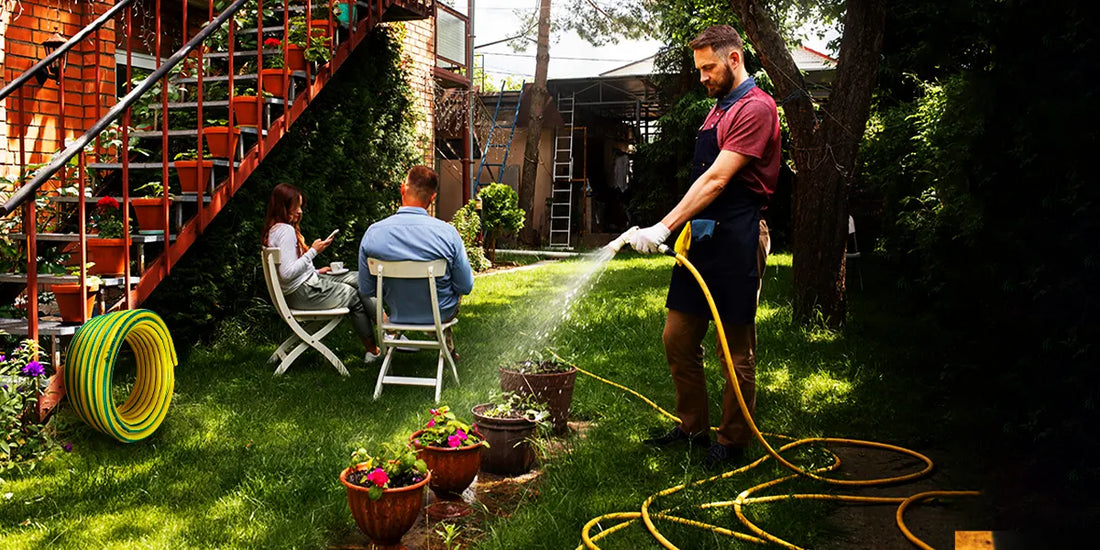
Choosing the appropriate garden hose is important for maintaining the health of your plants and the success of your outdoor environment, regardless of your level of gardening experience. With so many options available, it can be overwhelming to know where to begin.
In this comprehensive guide, we will walk you through every factor to take into consideration when selecting a garden hose that suits your needs and tastes. We'll explore the different materials used to make garden hoses, their sizes, and their special features. And also their important features to look for, such as kink resistance, burst pressure, fittings, and UV resistance. All these guides will help you choose the right garden hose for you.
Garden Hose

Garden hoses are long, flexible tubes used to carry water from a water source, like a faucet, to different areas of a garden or yard. The materials used to make these hoses, such as rubber or vinyl, are sufficiently flexible to bend around obstacles and corners without breaking. You can choose one that suits the size of your garden and water pressure because they are available in a variety of lengths and diameters.
Additionally, they have connections on both ends that let you attach them to faucets, sprinkler heads, and other accessories like spray nozzles. One thing about garden hoses is that they will twist or bend if not handled properly. But these hoses are versatile, not only on water plants, but they can also be used to clean your outdoor spaces, wash cars, and even in emergencies that need water.
Materials

Garden hoses are made from vinyl or rubber, each material has advantages and disadvantages. Understanding these materials can help you choose the right garden hose for your gardening needs. Vynil is one material that is commonly used to make garden hoses. Vynil hoses are cheaper, lightweight, and easy to handle. This is good to use for light-duty watering tasks like washing your car or watering plants. However, a garden hose made with vinyl is easy to break, especially in cold weather. Compared to other materials, they might not be as durable due to frequent usage or strong water pressure.
While the rubber material is less likely to twist or crack, it can tolerate increased water pressure. Rubber hoses are often used in commercial or industrial settings and are good for heavy-duty watering chores. But rubber hoses are typically heavier and more costly than vinyl hoses.
If you are looking for a garden hose that is kink-resistant and also has UV protection, you may check out our product, Reinforced Garden Hose
Size

Garden hoses come in different lengths and diameters. When choosing the length of a garden hose, you need to consider the layout of your garden and the distance from your water faucet. A longer hose allows you to reach a farther distance, while the shorter hose is limited to areas you can use but is manageable and easier to store.
The diameter of a garden hose refers to the width of the hose tube, typically measured in inches. Common diameters include ½ inch, ⅝ inch, and ¾ inch. The hose's pressure and water flow rate are impacted by its diameter. More water can pass through a hose with a larger diameter, increasing water pressure and speeding up watering. Larger-diameter hoses are ideal for heavy-duty jobs and high-water pressure, whereas smaller-diameter hoses are appropriate for lighter duties and lower water pressure.
Features

Garden hoses have special features that can help with your watering duties more easily. One of the useful features is kink resistance. Kinks are twists or bends in the hose that have the potential to stop the water flow. Kink-resistant hoses are made to stay straight, which guarantees a constant water flow and directs the hose over garden obstacles.
Another feature of garden hoses is their UV resistance. UV-resistant hoses are made from materials that are unlikely to fade or break from repeated exposure to sunshine. They can endure severe weather and stay longer than hoses without UV protection, which makes them perfect for outdoor use. Additionally, some garden hoses come with adjustable nozzles or spray patterns, allowing you to customize the water flow for different watering tasks. Gardeners also choose hoses with brass fittings since they are less likely to leak and have a longer lifespan.
Conclusion
In conclusion, choosing the ideal garden hose is important to keeping your outside area clean. You can choose a hose that suits your gardening requirements and preferences by taking into consideration factors like material, size, diameter, and special features.
Whether you have a small garden or a large yard, there's a garden hose out there to suit your needs. Remember to properly maintain and store your hose to prolong its lifespan and ensure efficient watering.
Hopefully, this guide helped you choose the perfect garden hose to keep your plants healthy, your outdoors clean, and gardening tasks free of hassle, and enjoy the ease and convenience of watering your garden.

